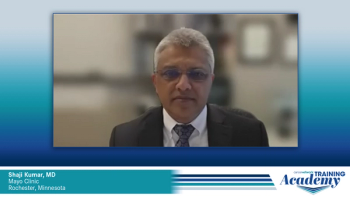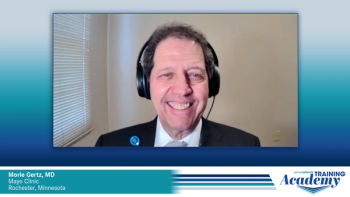
Opening the panel’s discussion on multiple myeloma management, Rafael Fonseca, MD, reviews treatment options available to patients at early or late relapse.

Your AI-Trained Oncology Knowledge Connection!


Opening the panel’s discussion on multiple myeloma management, Rafael Fonseca, MD, reviews treatment options available to patients at early or late relapse.

Expert Shaji Kumar, MD, spearheads a review of data from MajesTEC-1 and use of teclistamab therapy in patients with relapsed/refractory multiple myeloma.

Expert perspectives from Joselle Cook, MBBS, on use of elranatamab in relapsed/refractory multiple myeloma based on data from the MagnetisMM-1 trial.

Shared insight from Rafael Fonseca, MD, on data from MonumenTAL-1 and the use of talquetamab therapy in patients with relapsed/refractory multiple myeloma.

Before closing out the panel’s review of clinical data behind bispecifics in relapsed/refractory multiple myeloma, Morie Gertz, MD, highlights use of cevostamab therapy in this setting.

Comprehensive insights from experts in Mayo Clinic on the selection and sequencing of CAR T cell therapy or bispecifics, respectively, in patients with relapsed/refractory multiple myeloma.

A panel of key opinion leaders from Mayo Clinic reflect on optimizing use of bispecifics in relapsed/refractory multiple myeloma, reviewing step-up dosing, administration, and followup strategies.

Focused discussion on the mSMART guidelines for monitoring and managing adverse events associated with bispecific therapies in patients being treated for relapsed/refractory multiple myeloma.

Expert panelists from Mayo Clinic discuss their approach for the use of BCMA and non-BCMA targeting bispecifics, respectively, in patients with relapsed/refractory multiple myeloma.

Closing out their panel on bispecifics in relapsed/refractory multiple myeloma, key opinion leaders share closing thoughts and hopes for the future treatment landscape.

In a recent Training Academy, experts discussed how to incorporate bispecific antibodies into patients with multiple myeloma.